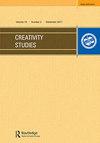立陶宛青少年社会情感能力的表达是其创造力的先决条件
Q1 Social Sciences
引用次数: 0
摘要
社会情感教育有时被认为是将学术知识与学校、家庭、社区、工作场所和生活中的成功联系起来的缺失部分。情商基本上是一个如今引起人们极大兴趣的概念,尤其是它通过促进最佳社会功能对人际关系的影响。该国和世界上最近发生的事件表明,如果儿童在获得知识方面没有获得坚实的道德基础,那将是多么危险。同时,与学术教学相结合的社会情感教育有助于解决这一问题。最近,关于社会情感教育及其对儿童心理健康的积极影响的讨论越来越多。社会情感能力(所谓“情商”、“社会智力”)是指与他人合作、富有成效地学习、在家庭、社区和工作场所发挥最重要作用的能力。成功不仅在学校,而且在以后的生活阶段都伴随着那些学生:a)现实地评估自己和自己的可能性(自我意识);b) 正确管理他们的感受并控制他们的行为(自我控制);c) 准确解读社会环境的标志(社会意识);d) 有效解决人际冲突(沟通技巧);e) 面对日常困难做出好的决策(负责任的决策)。因此,本文讨论了如何识别学生在社会情感教育中的知识和技能,同时识别仍存在一些差距的某些领域。本文章由计算机程序翻译,如有差异,请以英文原文为准。
THE EXPRESSION OF SOCIO-EMOTIONAL COMPETENCE AMONG YOUNGER LITHUANIAN ADOLESCENTS AS THE PRECONDITION FOR THEIR CREATIVITY
Socio-emotional education is sometimes referred to as the missing part that links academic knowledge to success in school, family, community, workplace, and life. Emotion intelligence is basically a construct that has gained rather great interest nowadays, especially its influence on interpersonal relationships by contributing to optimal social functioning. Recent events both in the country and in the world show how dangerous it is when children do not acquire a solid moral foundation in acquiring knowledge. Meanwhile, socio-emotional education linked to academic teaching helps to solve this issue. Recently, there has been more and more discussions about socio-emotional education and its positive impact on children’s psychological health. Socio-emotional abilities (so-called “emotional intelligence”, “social intelligence”) are the abilities to work together with others, to learn productively, to play the most important roles in the family, community, workplace. Success not only in school but also in later life phases accompanies those students who: a) realistically evaluates oneself and one’s possibilities (self-awareness); b) properly manages their feelings and controls their behavior (self-control); c) accurately interprets the signs of the social environment (social awareness); d) effectively resolves interpersonal conflicts (communication skills); e) makes good decisions in the face of day-to-day difficulties (responsible decision making). Therefore, this paper discusses on how to identify the knowledge and skills of students in socio-emotional education and at the same time to identify certain areas where some gaps still exist.
求助全文
通过发布文献求助,成功后即可免费获取论文全文。
去求助
来源期刊

Creativity Studies
Social Sciences-Cultural Studies
CiteScore
3.20
自引率
0.00%
发文量
38
审稿时长
15 weeks
期刊介绍:
Creativity Studies accepts original research articles with a focus on communication within the creative society. The journal welcomes contributions from scholars from diverse disciplines such as philosophy, sociology, history, political, communication and information sciences. Creativity Studies also publishes survey papers and descriptions of academic events in this area. The journal issues will be organized around different issues on creativity.
 求助内容:
求助内容: 应助结果提醒方式:
应助结果提醒方式:


